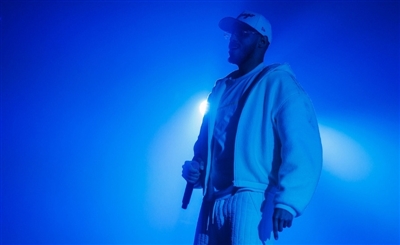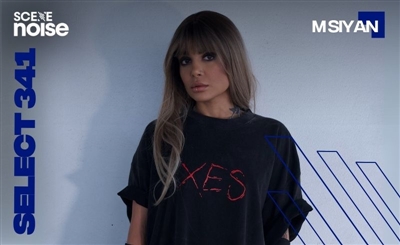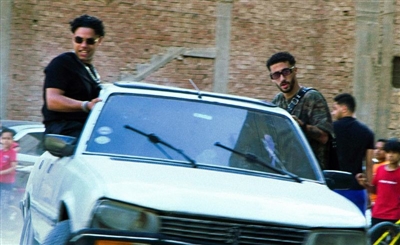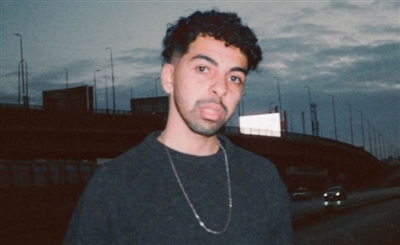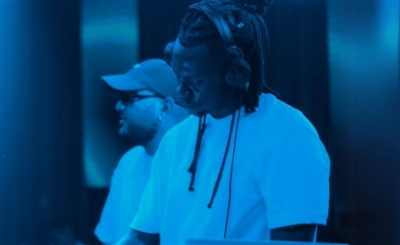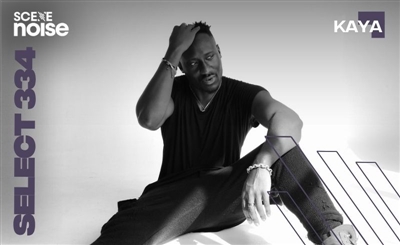El Morabba3: On Squares, Perfection and Politics
Scene Noise correspondent Kamila Metwaly meets the Jordanian band ahead of their first ever gig in Cairo to find out how they're reshaping the Arab music scene...
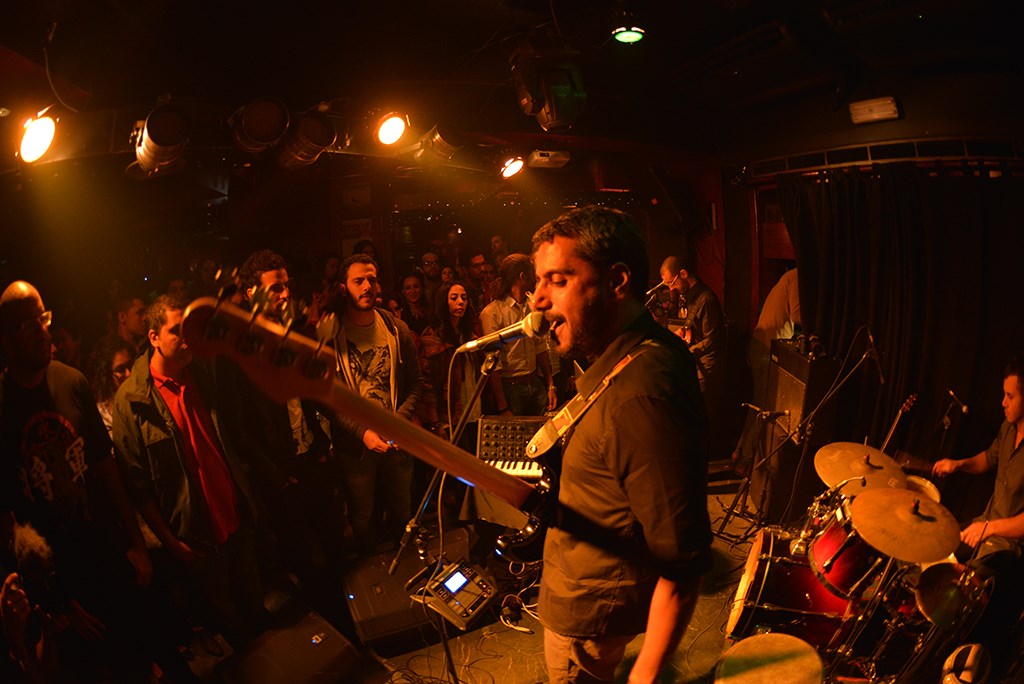
With an ever growing fan-base in Egypt, the Jordanian alternative rock band El Morabba3 finally met the Egyptian audience in three consecutive live concerts in Cairo last December. We managed to meet the trio somewhere in between their rehearsals and their sound check at the Cairo Jazz Club to speak about the band, its beginnings, its concept, reflections, inspirations and squares.
Meet the trio: Muhammed Abdullah (Bass, songwriter, and vocals), Odai Shawagfeh (electric guitar, keys/synth, producer) Dirar Shawagfeh (Drums).
El Morabba3 beginnings, a story in the band’s words…
Abdullah: It came into reality when Tarek El-Far3i and myself met and decided to make a band together back in 2008. El-Far3i, has just came back from the United States, and I was playing in a band called Tarweeg back then (Tarweeg being one of the songs that appear on El Morabba3 album), so we decided to make music together. All I knew then is that Tarek is a great drummer, so I asked him to play drums with Tarweeg. I didn't know that he is also a great songwriter and that has written series of songs. We both became kind of more creative in our working progress and how we approached music. I had a few songs written too, so we had material to start the project. The reason why Tarweeg didn't continue is because other members of the band left the country, which made Tarek and me kind of alone. We decided to look for new members that would be interested in working with us on the written material we had. We met with Dirar, who became our permanent drummer afterwards. We had no doubts about him; we knew from the start that he will be a great addition to the project we were yet to establish. We were, however, most worried about the choice of the guitarist; El-Far3i and I always wanted to work with someone that was experimental with sound more than someone heavily technical.
At that point, we didn't know where were we going with this project, we liked the music we made and the words we composed. Later, Odai - the drummers’ brother - who is very much sound oriented with his guitar joined the project. He is very talented musician, we knew when listening to what he does on his guitar that this is exactly what we are looking for.
And then when did the name come into the equation?
Abdullah: It happened in the least planned for or expected way. Actually the one who came up with the name is Hamza from Autostrad; he is a close friend of Tarek’s and at that point they were actually roommates. So we, as in today's El Morabba3, used to jam a lot at Tarek’s place because there was a nicely, sound isolated room in which we could work. When we started jamming, we didn't really have a name for the band, our focus was the music. One day Hamza called up Tarek and asked him "What are you doing?" Tarek replied saying that he is jamming with the guys. So Hamza asked him “Who? El Morabba3? The three guys you were with the other day?” Tarek came back to us after he hung up and told us why not use the name El Morabba3temporarily until we come up with something else? The name stuck.
Two years into the release of your first album, how do you feel about your work?
Odai: We were less thinking sound and more music, which has changed greatly over the past two years. We have also worked with a producer who has, of course, affected the outcome of the album. It sounds great and is very well produced, however I am looking forward to exploring more sound based compositions, soundscapes and electronics in our upcoming releases. I think that the specific sound aspect we have achieved with the song Zein, is the closest to how I feel about music and sound integration, and it came out pretty good in my view. Musically speaking I consider Aghaneek one of our best music compositions on that album; whenever I listen to this song, I feel that it has a very unique melody which I personally haven’t heard before.
Dirar: I feel that the album was a great success considering it was first release. In the song Ma Andak Khabar for example, I feel that we managed to greatly incorporate some serious post rock and I like it a lot. It’s a very well composed song and has some great consideration for its structure, composition and even recording.
Abduallah: I think one of the successes of the album is that after the release, many Jordanians have been more interested in listening and exploring the indie and underground music in the region. To me, I think this is one of the best successes for E Morabba3.
Do you live off music or you have other jobs?
Abdullah: We all have other jobs for the stable income... it’s not easy at all to depend solely on music in Jordan. We sure hope to get there someday.

Abdullah, I heard you’re an owner of a pretty popular restaurant in Amman. What’s the best on your menu? And what dishes are most ordered by El Morabba3 members?
Abdullah: Yes, I’m a partner in a small tea bar called Turtle Green Tea Bar. We specialise in tea and herbal blends. El Morabba3guys usually order Manakeesh which work great with tea.
Why did El-Far3i leave and how have you been dealing with his departure?
Abdullah: El-Far3i left Jordan to live abroad, that’s why he was no longer able to take part of El Morabba3’s plans. We sure enjoyed working with him especially that he acquires a great spirit and positive vibe. We decided to focus more on El Morabba3 as a project and we expect future collaborations with El-Far3i whenever circumstances allow.
Are you considering to feature other rappers and artists to play with El Morabba3? And whom would you want to work with?
Abdullah: We would like to collaborate with artists and share mutual musical experiences. We don’t have someone specific in mind but we’re open to suggestions.
Your cover album is one of the very few very well thought of and designed artworks in the Arab region. Tell us more about it and how did you reach that outcome?
Abdullah: With our first release, we abused the name of the band in the artwork. The shape of the square speaks on our behalf. We used the square as our core inspiration to the album artwork, however we also worked on the albums typography to resemble the exact angles, shapes and edges of the original square used in the artwork. As I mentioned earlier, it’s a window through which we hope our fans could also escape to new dimensions of their world.
Musically speaking, how did you work with the concept of the square?
Odai: The shape of the square has put us in a state of expression and has given us an ability to look beyond the shape. We are always trying to create something new, introduce new sounds and even though our music is not experimental we are highly experimental with what we do. We are kind of looking at the other side of the square to find new inspirations and ideas that we would want to reflect upon through our music. That being said, we hope that this also enables our listeners to watch us through the shape of that square, through a shape and form that would become very personal to them.
The square as a form consists of certain limitations. It has a very specific, defined and highly functional shape. Has El Morabba3 become ever a limitation for your music?
Abdullah: It’s actually these limitations the square portrays that address the realistic aspect of what we do… yes we are faced with limitations which any musician in the region is familiar with.
It’s about breaking free from these boundaries, which we try to do through our music.

Why haven’t you performed in Egypt before, even though you have such a huge fan base here?
Abdullah: We have been always hearing from our fellow musicians that experiencing playing live in front of the Egyptian audiences is the best! Of course we were very keen to come to perform live and experience that audience. Every band we spoke with had such a great time here. Also statistically speaking, the biggest audiences that listen to us or connect with us via our social media platforms come from Egypt. We always get some great messages from Egypt and we know that there is a very big Egyptian crowd that we could play to. The problem was and still remains to be, that I am Palestinian and I hold a temporary Jordanian passport. So to get into Egypt it is a big issue, and especially with the current sociopolitical situation in Egypt. We’ve been invited to El-Bernameg before and we tried to come through several organisations, but we couldn’t make it. So it’s all about the paperwork.
Your fans have been associating El Morabba3 to be a political band. Yet your statements on the bands Facebook page state the opposite…
Abdullah: We hate politics and politicians; however the truth also is that reality prevails and enforces itself onto us as human beings. I always say that if you want to be honest in the topics you discuss through your music, then inevitably you have to talk about politics and society. That is because we live in a world that is all about politics, politicians and societal problems. Being a Palestinian member of the group and not being able to move freely around the region is a political matter, I can’t really detach those matters when I write and not directly or indirectly discuss them through my lyrics. In our words, we do not adopt any political point of view, but actually how these political situations affect us as human beings on daily basis.
In Egypt, as well as many other Arab countries, the English translation of the word El Morabba3 “The Square” has been highly associated with words such as: ‘freedom’, ‘social equality’, ‘bread’, ‘change’… are these expressions ever present in your music from a sociopolitical perspective?
Abdullah: Yes sure they are…maybe not literally but the music and lyrics call for freedom and change and whatever is good for humanity.
When listening to “Aghaneek” one feels that the use of the vocal effect is purposively there to resemblance of a muezzin’s prayers call at dawn time. The vocal sound effect features rusty mosque speakers that mirror the sound of series of delayed prayers being called at the same time, resulting in both symmetry and chaos. Was that an intentional choice when processing the vocals for this song?
Abdullah: We haven’t planned for it purposively but we have grown gradually to understand the concept you are talking about and to some extent we relate to it greatly. I think that this effect has to do with both my singing technique in that song and the effects used to destroy the beauty of that singing in the same time. The reason listeners could mirror to the sound of the Adan when listening to Aghaneek is because the speakers through which those prayers are coming out are ruined completely. You are not the first person who heard the Muezzins prayers calling through Aghaneek, and since the last time we’ve been told that remark, we kind of started pushing that sound more; the rustiness, and damage it causes to the beauty of the vocal melody.
Odai: We intended to use those rusty effects of course, but not in reference to the prayers. Usually the Arabic singers go for the crystal clear vocal processing. Vocalists, in general, in Arabic music are the heroes of the songs, making the music less important. Of course we don't want that! Through our music we usually mix the vocals to give space to music and sound; we consider a voice another instrument that we work with, that voice is more expressive because at many times it is embodied through words, but at the end it’s another sound, another layer that is a part of the many layers that composite our songs.

In Cairo Jazz Club, we heard a lot of electronic production in your songs; are you going to change the sound of El Morabba3 to a more electronic band?
Odai: We are exploring our options and developing our soundscapes. There is so much out there that we would like to experiment with and include in our songs in the future. We don’t really know what is next for us and we don’t pre-think what are we going to do next but electronic, either analogue or digital, is definitely a part of our future sound.
Now you’ve played in front of Egyptian audiences, will we see you again?
Abdullah: The experience in Cairo was just amazing. We’ve been waiting for it for quite a while; and it was definitely worth it. Wonderful crowd and vibe; we will definitely do it over and over again.
You are working on your second release; can you tell us more about it?
Abdullah: We want to work more on the details; that is why we’re taking our time for the second album. Meanwhile we will be releasing singles soon. You can expect synth electronic sounds and much more!
Find out more about El Morabba3 on their official Facebook page here.
Studio photos by Shady Habash. Main concert photo by Muhammed Reda.
- Previous Article Getting Abyusif
- Next Article DGTL: Much More than a Music Festival
Trending This Month
-
Jun 04, 2025
-
Jun 05, 2025



